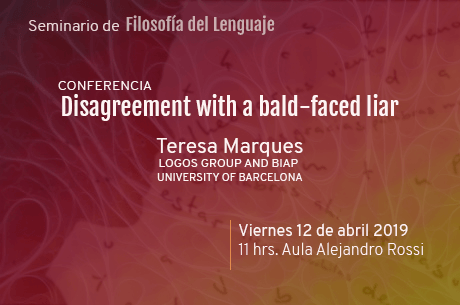Conferencia: Disagreement with a bald-faced liar
|
|
|
|
|
conferencia
Teresa Marques
Viernes 12 de abril 2019
ABSTRACT Against these views, I argue that we are right in judging that bald- faced lies (defeasibly) deserve more intense condemnation than disguised lies (there may be extenuating or attenuating circumstances -- e.g. lies that are courteous or required by etiquette). If the bald-faced lies-are-fiction were a correct theory, we would be mistaken in criticizing walk backs of the illocutionary force of a bald-faced lie, e.g., that Trump's claims are to be taken "symbolically" and not literally (Scaramucci), or Giuliani's claim that his earlier statements about the timeline of negotiations with Russian officials about a Trump Tower project in Moscow were "hypothetical" and not intended to convey facts. Rather, this walk back is condemnable because indeed those statements were assertions. Bald-faced lies contribute to gaslight. Gaslighting dominates the hearer by diminishing her good epistemic stance. Bald-faced lies plant doubts in the hearer, either by questioning her perception – “who are you going to trust, me or your lying eyes?” –, her memory, or her rationality. By undermining the hearer's epistemic stance, it diminishes the hearer's degree of belief in the falsity of what the speaker said. I conclude by arguing that disagreement with a bald-face liar requires not only reinstating the truth, but also to refuse the assumption that the abusive speaker honors conversational illocutionary norms when he asserts.
Informes: Dr. Mario Gómez Torrente |
Aviso de privacidad




 Circuito Maestro Mario de la Cueva s/n, Ciudad Universitaria, C.P. 04510, Coyoacán México, CDMX
Circuito Maestro Mario de la Cueva s/n, Ciudad Universitaria, C.P. 04510, Coyoacán México, CDMX